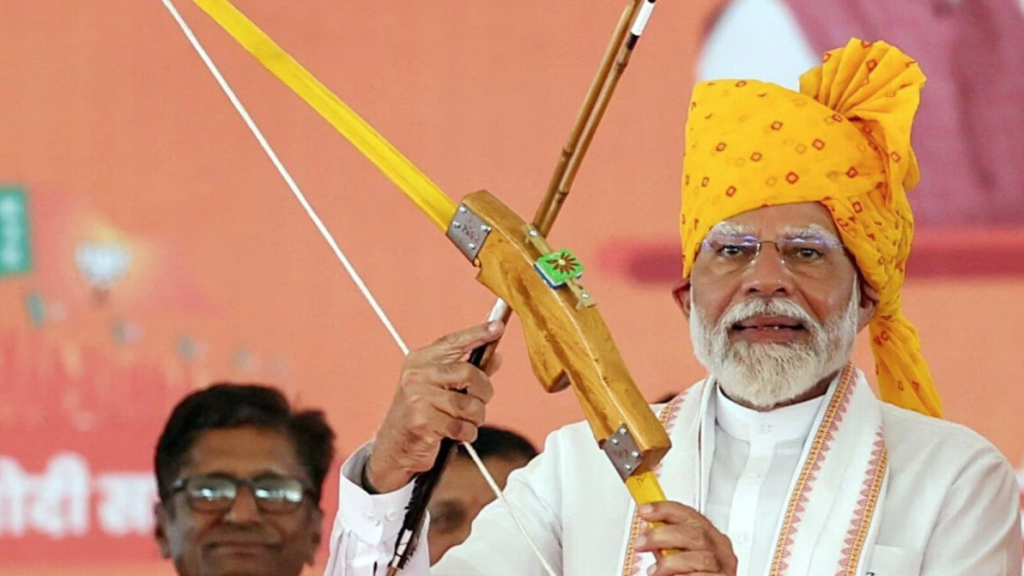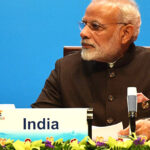
With this year’s elections in progress, every minority vote that the Bharatiya Janata Party (BJP) puts in its column adds to the chance for Prime Minister Narendra Modi’s National Democratic Alliance (NDA) coalition to move past 400 seats in the Lok Sabha elections. Therefore Modi, despite being a confessed member of the Hindu nationalist organization Rashtriya Swayamsevak Sangh (RSS), has made an unlikely pitch to win the hearts of India’s nearly 200 million Muslims.
Helping his chances is the fact that India’s minority communities no longer vote in lockstep. Hindu-majority parties resolved that former tendency to their advantage years ago through the genesis of the “Hindutva 2.0” voting bloc. Hindutva, a form of cultural nationalism, centers on a unified approach to Indian identity, but it now has been supplemented with a second prong: a heavy emphasis on India’s economic progress.

But according to the consensus view of observers, BJP strategists have concluded that the alliance coalition needs to do more than simply duplicate its performance in the 2019 elections. It must outperform in southern states such as Tamil Nadu, Kerala and Andhra Pradesh, where the BJP has had very limited success in the past. That means generating a limited but concerted appeal to India’s large Muslim population. To do this, BJP is threading the needle between cultural and economic issues in an attempt to move the electorate in its favor.
Take Kerala as an example. A report in The Economic Times recalls the experience of the BJP’s sole Muslim candidate in the country, M Abdul Salam, who had difficulty connecting with Muslim voters, particularly in a constituency where 70% of the 4 million people are Muslims and where the Indian Union Muslim League is very popular.
Now the cultural and economic threads being woven by the BJP might be expanding the party’s big tent. Salam extols the development progress under Modi, while women show favorability because of Modi’s championing of the ban on “triple talaq” instant divorces, a custom that had disadvantaged Muslim women unfairly.
But Indian Muslims should be wary of this political strategy as it occurs amid a wave of anti-Muslim sentiment and the deliberate promotion of the Hindu-nationalist ideology that was present well before the 2019 Lok Sabha elections and remains to the present day.
Recall the emphasis on “hyper-nationalism” after the terrorist attacks in Jammu and Kashmir, where anti-Muslim sentiment was encouraged – as evidenced by right-wing BJP members of Parliament including actor and former MP Paresh Rawal, who begged news channels not to allow “Indian terrorist sympathizers to spew venom against our dear motherland” and to “let those maggots die in their own filth.” Gradually, the hyper-nationalism was condensed into a supposedly softer cultural appeal through the now-modified ideology termed Hindutva 2.0.
Adding weight to a counter-argument that Modi’s Muslim appeal is merely electoral manipulation are his recent comments in the western Indian state of Rajasthan, where previously the BJP swept all 25 seats. The prime minister was accused of reactivating anti-Muslim tropes as he labeled Muslims “infiltrators” and accused the Congress Party of aiming to redistribute India’s wealth to “those who have more children,” referring to the Muslim population he had spoken of earlier in his address.
The BJP and Modi have long accused former Prime Minister Manmohan Singh and the opposition Indian Congress of being too favorable to Muslims. The idea of a 6,000 rupee universal basic income for the poorest 20% of households is hardly the massive redistribution of wealth Modi claims it to be.
Modi’s Hindu nationalist drive has come at the expense of the Muslim population. A string of setbacks started with the revocation of autonomy in Jammu and Kashmir. Then came the enactment of the Citizenship Amendment Law, which allowed members of some religious minorities who entered India from neighboring Bangladesh, Pakistan and Afghanistan prior to December 2014 to claim Indian citizenship.
International human rights groups denounced the law as discriminatory as Muslims were specifically excluded from its benefits. The UN Office of the High Commissioner for Human Rights also expressed concern, saying the law is “fundamentally discriminatory in nature and in breach of India’s international human rights obligations.”
Late last year, as Modi switched India’s foreign policy decidedly toward Israel after the October 7 Hamas attack, anti-Muslim sentiment jumped. Exploiting the grievances felt by Hindu nationalists toward nearby Pakistan, extremists on the right are using the same cultural and religious symbolism to flood social media with hateful messages.
Right-wing accounts sharing misleading videos are often connected with hate toward Islam. More recently, fake news videos circulating on YouTube have praised Modi while proliferating conspiracy theories. For example, Muslims in Kerala are accused of wanting to make the southern state an “Islamic State.”
The dual messages, one divisive and cultural and the other nationalist and predatory, continue in a delicate balance until the end of the Lok Sabha elections. It’s important for the BJP to contest seats in states like Rajasthan; while the BJP knows it is dominant, the 2023 Assembly election revealed that the Congress’s share of the vote did not precipitously decline despite a loss.
The BJP might also take advantage of intra-party problems, attempting to pick up votes from the Samajwadi Party in Uttar Pradesh, which sought to shed a “Muslim-Yadav” label in order to attract other members of other castes that have moved closer to the BJP in recent years.
It can also take advantage of the Indian Congress’s tactical mistakes, such as in Maharashtra in India’s west where it nominated no Muslim candidates out of a total of 48, which could depress Muslim turnout.
While the electoral tactics are clear, a genuine BJP appeal to Muslim voters in India remains both baffling and disingenuous. Some have argued the 2024 elections are an opportunity to move beyond the “politics of negativity” while ignoring the incandescent hate that drives the right-wing electorate. The audacity on India’s right beggars belief.





